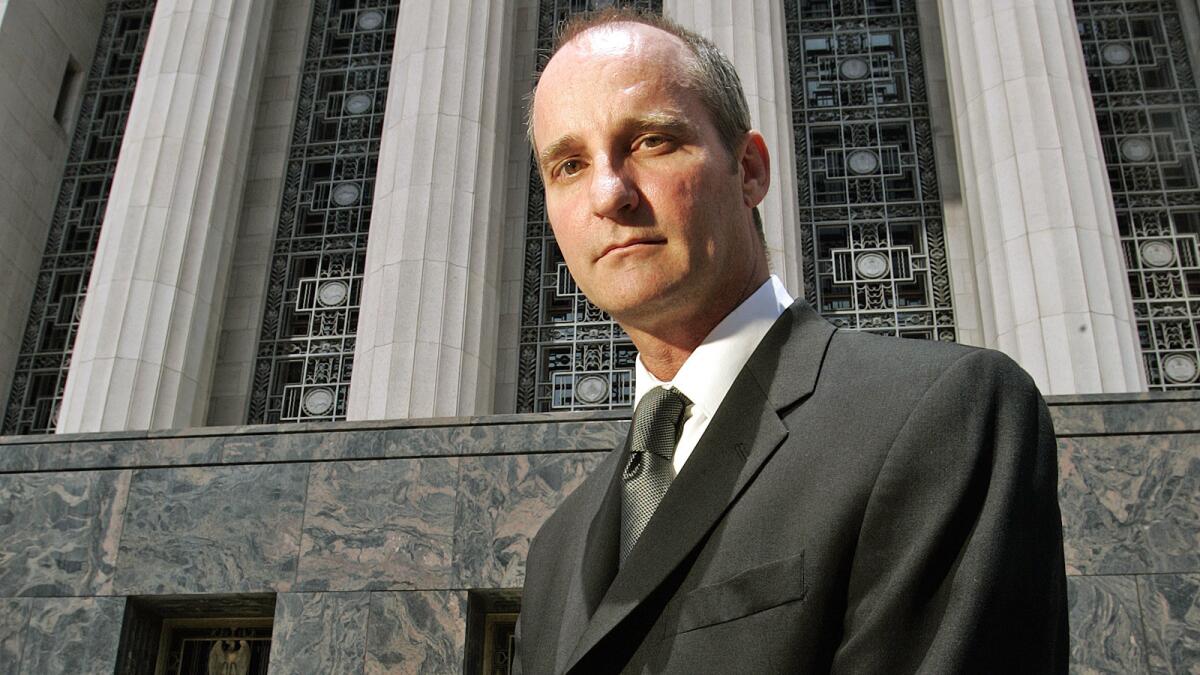Convicted medical pot seller finds congressional allies in legal appeal

Charles Lynch, shown at the federal courthouse in L.A. in 2008, operated a medical marijuana dispensary in Morro Bay and was convicted that year of violating federal drug laws.
For years, Charles Lynch has waged a lonely battle against federal prosecutors intent on putting him in prison for selling medical marijuana.
But last week he received help from unexpected — and influential — allies.
In a strongly worded brief filed with the U.S. 9th Circuit Court of Appeals, U.S. Reps. Dana Rohrabacher (R-Costa Mesa), and Sam Farr (D-Carmel), accused prosecutors of flouting federal law as they go after Lynch and called on the court to end the case against him.
The congressmen entered the fray over Lynch by chance. The pair were the authors late last year of a small but significant amendment to federal law that was meant to prevent the Department of Justice from interfering with states where medical marijuana is legal.
The amendment, which won unusual broad bipartisan support when it passed in December, was written into a government spending bill. It forbids the Justice Department from using funds in a way that hinders states “from implementing their own state laws that authorize the use, distribution, possession or cultivation of medical marijuana.”
The measure was viewed by many as a turning point after years of conflict between federal authorities intent on upholding the nation’s drug laws and states where medical marijuana had been made legal. In light of the ban on spending, it was assumed federal prosecutors would have no choice but to abandon cases such as the one against Lynch.
Justice Department officials, however, have resisted such a sweeping interpretation of the amendment. In general, they have argued the spending ban forbids them from meddling in the affairs of state officials but does nothing to stop them from going after sellers.
In court filings, prosecutors in Lynch’s case indicated they believe Lynch is particularly fair game for federal prosecution because he was accused of violating California’s own marijuana laws when he ran his Morro Bay dispensary.
Rohrabacher and Farr, in their brief to the court, called the Justice Department’s more narrow take on the spending ban “patently absurd” and “emphatically wrong.”
“Permitting the DOJ to spend more federal funds to prosecute one of the very cases Congress intended for the DOJ to cease prosecuting defeats the purpose of the Rohrabacher-Farr amendment entirely,” the lawmakers wrote.
The legal skirmishing over what the ban does — and does not — prohibit underscores irreconcilable conflicts between state laws that permit marijuana and federal law, which bans it outright. It comes as the nation’s pot landscape continues to shift and Americans move toward greater acceptance of the drug.
Currently, about two dozen states and Washington, D.C., allow marijuana sales to patients with documented illnesses, and several other states are considering it. Last year, a large national survey showed for the first time that a majority of Americans favored legalizing marijuana use.
President Obama and others in his administration have said in recent years that marijuana prosecutions in states that allow the drug should not be a priority. In California, however, Justice Department officials have persisted in targeting several dispensaries.
Lynch’s attorney, deputy federal public defender Alexandra Yates, tried unsuccessfully this year to convince a panel of justices from the 9th Circuit that the congressmen’s amendment prohibited the Justice Department from continuing its case against Lynch. The panel deferred the question until the court takes up Lynch’s appeal several months from now.
In their brief, Rohrabacher and Farr criticized the court’s indecision, saying it sent a message that the Justice Department is “entitled to ignore Congress’ explicit prohibition on the use of federal funds to continue prosecuting this case.”
Douglas Berman, a law professor at Ohio State University and editor of the Marijuana Law, Policy and Reform blog, said that although he believes prosecutions such as the one of Lynch are out of sync with the broad acceptance in the U.S. of medical marijuana, the wording of the amendment left its intent “pregnant with uncertainty.”
Although defendants in a handful of other cases in California and Washington have also used the spending ban to challenge their prosecutions, there has been no clear ruling on the issue, Berman said.
Lynch, 52, was convicted in 2008 of violating federal drug laws after a closely watched trial. In starkly contrasting portrayals, his defense team sought to present him as an above-board businessman who had the blessing of the town’s mayor and city attorney, while prosecutors depicted him as a common drug dealer who sold to teenagers. They focused on the volume of Lynch’s sales, which they said amounted to about $2 million in the 11 months the dispensary was open.
Lynch’s attorneys said they were hamstrung by the judge in the case, who decided Lynch’s reliance on state laws that permitted the sales was irrelevant. The judge went so far as to bar the lawyers from mentioning the phrase “medical marijuana” during trial.
Lynch was sentenced to a year and a day in prison. He was allowed to remain free on bond, pending his appeal. Unemployed and broke, Lynch lost his home to foreclosure and now lives in a trailer in the backyard of his mother’s home in New Mexico, Yates said.
Rohrabacher and Farr, along with Yates, have petitioned the 9th Circuit to reconsider the question of the spending ban quickly. The rush is necessary, they said, because the issue could become moot when the current spending bill that contains the spending ban amendment expires at the end of September. In an interview, Farr said he was hopeful he and Rohrabacher would be able to muster the votes to include the ban again in the next fiscal year’s spending bill.
State Sens. Mark Leno (D-San Francisco) and Mike McGuire (D-Healdsburg), and former state Sen. Darrell Steinberg followed the representatives last week with a similar brief to the court.
“One would hope that our federal government has more important matters to address than shattering the lives of law-abiding citizens like Charles Lynch,” Leno said in a statement to The Times. “To quote President Obama in reference to states which allow for the legal use of marijuana, ‘We’ve got bigger fish to fry.’ These unwarranted raids, seizures and prosecutions must stop.”
Twitter: @joelrubin
More to Read
Sign up for Essential California
The most important California stories and recommendations in your inbox every morning.
You may occasionally receive promotional content from the Los Angeles Times.











